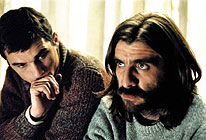|
|
|
|
Good
Morning, Night
|
 |
|
If there is one thing that Italian cinema excels in at the start of the twenty-first century, it is surely lyricism. Every film I previewed for the 2004 Italian Film Festival held in Australia contained at least one magical burst of rapture in which music, landscape, the liberated movement of the camera and the choreography of the human body combined to create a blessed moment of release. But a darker kind of lyricism drives Marco Bellocchio's masterly Good Morning, Night – marking once more this director's glorious resurgence, after My Mother's Smile (2002). Here, he offers a free rendition of the terrorist kidnapping by the Red Brigade of Christian Democrat Prime Minister Aldo Moro in 1978. It uses many actual documents and details – from the eyewitness account The Prisoner by ex-Red Brigade member Anna Laura Braghetti to Moro's letters and the odd fact that a film screenplay was found among the latter's final possessions – as inspiration, but spins from them something wholly, richly imagined and dramatised. The angle on these events is not overtly political – the theoretical ideology of the Red Brigade is, for instance, reduced to a couple of chanted phrases. Bellocchio, however, remains absolutely faithful to the intuition that first shaped his art back in Fists in the Pocket (1965) – that the whole unconscious mess of parents and children, desire and identity, memory and loss, can never be divorced from public acts of politics. From its first beautifully droll scene of a Red Brigade couple seemingly innocently house-hunting, Good Morning, Night is a film about a kind of domestic "normality" that is a million miles away from the haunted heroine, Chiara (Maya Sansa, also excellent in Fiorella Infascelli's The Wedding Dress [2003]). Both in the playacting masquerade of the Brigade members and in the fearsome sense of abandonment and isolation felt by Moro (the government was suspiciously slow in tracing him, a fact which forms the basis of various conspiracy theories), Bellocchio's film connects with the metaphysical void traced by Kubrick in Eyes Wide Shut (1999). The sight of old Moro (Roberto Herlitzka) in his makeshift cell stirs memories of Chiara's own father, an anti-fascist fighter during World War II. Bellocchio's grasp of these complexities is poetic and bottomless. There is mystery in his work, but it is not at all a soft or vague sort of mystery: it is lucid and steely, a pearl-dive into the inky depths of the unconscious and of History, as in Buñuel. The suspended, open end-point of the film takes the form of a wishful resurrection fantasy – Moro enjoying the kind of freedom of everyday movement denied both public politicians and terrorists – that puzzled American distributors enough that Bellocchio had to spell out the tragic end of the real-life saga. In Europe, Good Morning, Night was widely compared to another film which appeared at the same moment, Bernardo Bertolucci's The Dreamers (2003) – both by giants of the '60s now looking back upon the radical legacy that formed them. But where Bertolucci's movie dribbles away in a lazy, nostalgic kind of lyricism, Bellocchio revels in subtle but devastating touches of blackly comic surrealism – such as an indelible scene involving the Pope. Indeed, as the film proceeds, it gradually becomes more dreamlike and hallucinatory, almost like a mature David Cronenberg movie. We keep slipping from level to level, reality to memory to dream to nightmare. Although it is possible to fault Bellocchio's commitment to leftist ideals of change, justice and revolution, and to criticise the caricaturing of terrorists as inhuman which this attitude necessitates, it is impossible to see the film as an apology for the political status quo. In this regard, the final archival glimpse of the government funeral for Moro – a bleak and empty ceremony if there ever was one – says it all. Bellocchio gives us the salutary reminder that, back in the era of Federico Fellini, movies once deployed lyricism not merely as a decorative supplement but as an entire, expansive way of viewing and analysing the world. Perhaps this is once again the way forward for Italian cinema. MORE Bellocchio: Blood of My Blood, The Traitor, Marx Can Wait © Adrian Martin October 2004 |
![]()